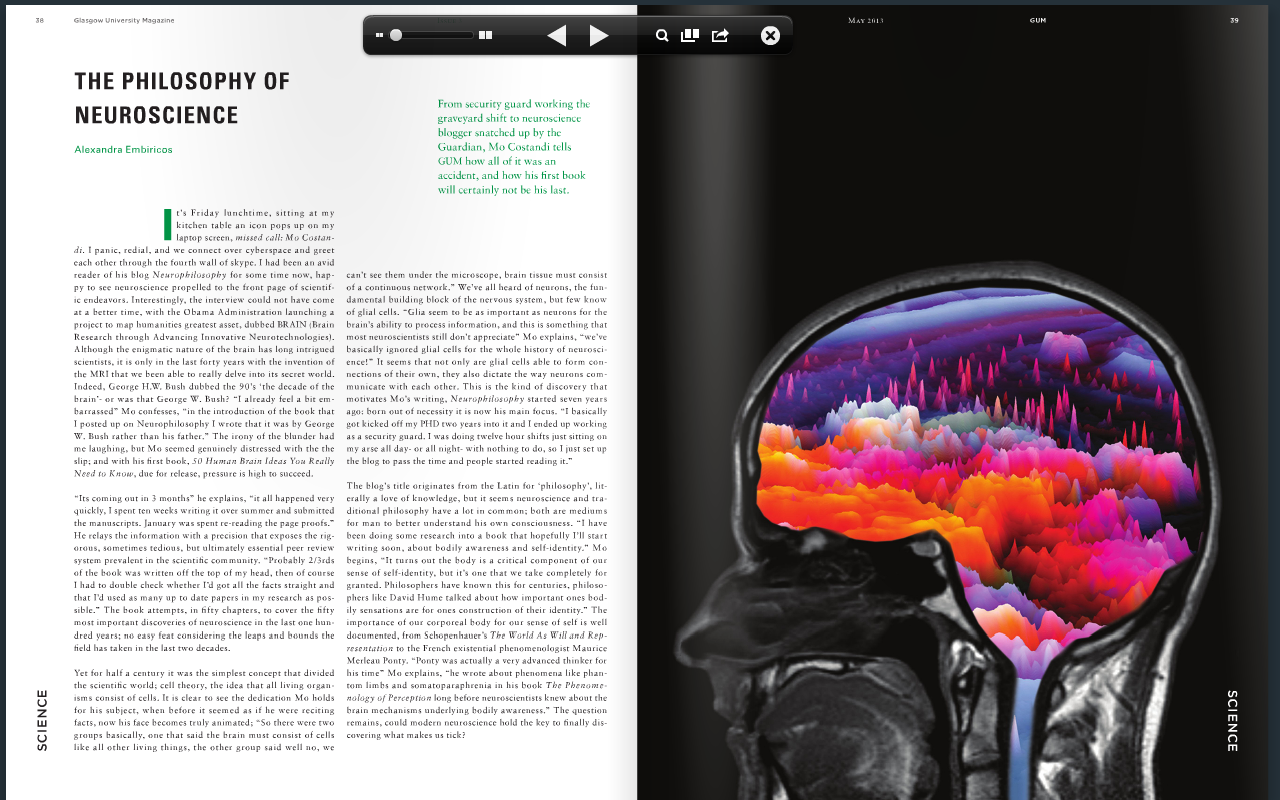From security guard working the graveyard shift to neuroscience blogger snatched up by the Guardian, Mo Costandi tells GUM how all of it was an accident, and how his first book will certainly not be his last.
It’s Friday lunchtime, sitting at my kitchen table an icon pops up on my laptop screen, missed call: Mo Costandi. I panic, redial, and we connect over cyberspace and greet each other through the fourth wall of skype. I had been an avid reader of his blog Neurophilosophy for some time now, happy to see neuroscience propelled to the front page of scientific endeavours. Interestingly, the interview could not have come at a better time, with the Obama Administration launching a project to map humanities greatest asset, dubbed BRAIN (Brain Research through Advancing Innovative Neurotechnologies). Although the enigmatic nature of the brain has long intrigued scientists, it is only in the last forty years with the invention of the MRI that we been able to really delve into it’s secret world. Indeed, George H.W. Bush dubbed the 90’s ‘the decade of the brain’- or was that George W. Bush? “I already feel a bit embarrassed” Mo confesses, “in the introduction of the book that I posted up on Neurophilosophy I wrote that it was by George W. Bush rather than his father.” The irony of the blunder had me laughing, but Mo seemed genuinely distressed with the the slip; and with his first book, 50 Human Brain Ideas You Really Need to Know, due for release, pressure is high to succeed.
“Its coming out in 3 months” he explains, “it all happened very quickly, I spent ten weeks writing it over summer and submitted the manuscripts. January was spent re-reading the page proofs.” He relays the information with a precision that exposes the rigorous, sometimes tedious, but ultimately essential peer review system prevalent in the scientific community. “Probably 2/3rds of the book was written off the top of my head, then of course I had to double check whether I’d got all the facts straight and that I’d used as many up to date papers in my research as possible.” The book attempts, in fifty chapters, to cover the fifty most important discoveries of neuroscience in the last one hundred years; no easy feat considering the leaps and bounds the field has taken in the last two decades.
Yet for half a century it was the simplest concept that divided the scientific world; cell theory, the idea that all living organisms consist of cells. It is clear to see the dedication Mo holds for his subject, when before it seemed as if he were reciting facts, now his face becomes truly animated; “So there were two groups basically, one that said the brain must consist of cells like all other living things, the other group said well no, we can’t see them under the microscope, brain tissue must consist of a continuous network.” We’ve all heard of neurons, the fundamental building block of the nervous system, but few know of glial cells. “Glia seem to be as important as neurons for the brain’s ability to process information, and this is something that most neuroscientists still don’t appreciate” Mo explains, “we’ve basically ignored glial cells for the whole history of neuroscience!” It seems that not only are glial cells able to form connections of their own, they also dictate the way neurons communicate with each other. This is the kind of discovery that motivates Mo’s writing, Neurophilosophy started seven years ago: born out of necessity it is now his main focus. “I basically got kicked off my PHD two years into it and I ended up working as a security guard. I was doing twelve hour shifts just sitting on my arse all day- or all night- with nothing to do, so I just set up the blog to pass the time and people started reading it.”
The blog’s title originates from the latin for ‘philosophy’, literally a love of knowledge, but it seems neuroscience and traditional philosophy have a lot in common; both are mediums for man to better understand his own consciousness. “I have been doing some research into a book that hopefully I’ll start writing soon, about bodily awareness and self-identity.” Mo begins, “It turns out the body is a critical component of our sense of self-identity, but it’s one that we take completely for granted. Philosophers have known this for centuries, philosophers like David Hume talked about how important ones bodily sensations are for ones construction of their identity.” The importance of our corporeal body for our sense of self is well documented, from Schopenhauer’s The World As Will and Representation to the French existential phenomenologist Maurice Merleau Ponty. “Ponty was actually a very advanced thinker for his time” Mo explains, “he wrote about phenomena like phantom limbs and somatoparaphrenia in his book The Phenomenology of Perception long before neuroscientists knew about the brain mechanisms underlying bodily awareness.” The question remains, could modern neuroscience hold the key to finally discovering what makes us tick?
Originally seen in Glasgow University Magazine, Issue #3
Words: Alexandra Embiricos


